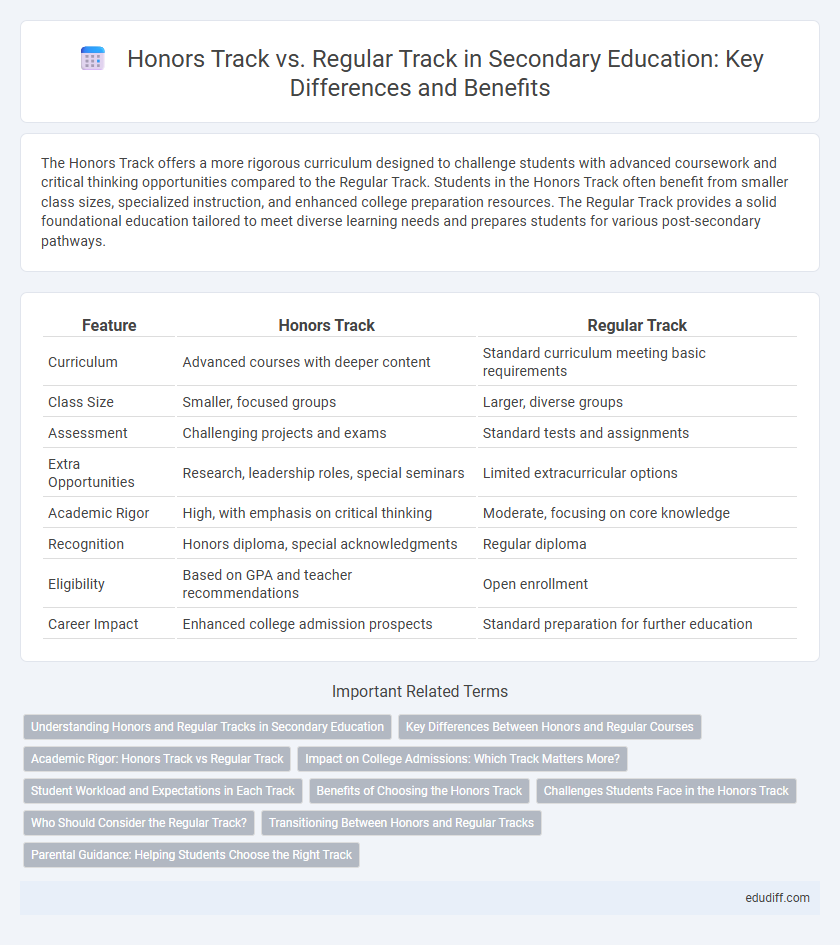The Honors Track offers a more rigorous curriculum designed to challenge students with advanced coursework and critical thinking opportunities compared to the Regular Track. Students in the Honors Track often benefit from smaller class sizes, specialized instruction, and enhanced college preparation resources. The Regular Track provides a solid foundational education tailored to meet diverse learning needs and prepares students for various post-secondary pathways.
Table of Comparison
| Feature | Honors Track | Regular Track |
|---|---|---|
| Curriculum | Advanced courses with deeper content | Standard curriculum meeting basic requirements |
| Class Size | Smaller, focused groups | Larger, diverse groups |
| Assessment | Challenging projects and exams | Standard tests and assignments |
| Extra Opportunities | Research, leadership roles, special seminars | Limited extracurricular options |
| Academic Rigor | High, with emphasis on critical thinking | Moderate, focusing on core knowledge |
| Recognition | Honors diploma, special acknowledgments | Regular diploma |
| Eligibility | Based on GPA and teacher recommendations | Open enrollment |
| Career Impact | Enhanced college admission prospects | Standard preparation for further education |
Understanding Honors and Regular Tracks in Secondary Education
Honors tracks in secondary education offer rigorous coursework designed to challenge students with advanced concepts and accelerated learning pace, promoting deeper critical thinking and problem-solving skills. Regular tracks provide a standard curriculum that ensures foundational knowledge and skills essential for academic success and graduation requirements. Understanding the distinctions between these tracks helps students and educators align educational goals with individual learning needs and future academic or career aspirations.
Key Differences Between Honors and Regular Courses
Honors courses offer accelerated pacing, deeper content exploration, and enhanced critical thinking opportunities compared to regular courses, which follow a standard curriculum with a broader focus on foundational concepts. Assessments in honors tracks often demand higher analytical skills, including complex problem-solving and comprehensive projects, while regular track evaluations emphasize basic comprehension and skill mastery. Class sizes in honors programs tend to be smaller, promoting more individualized instruction and interaction, whereas regular classes typically accommodate larger groups.
Academic Rigor: Honors Track vs Regular Track
The Honors Track offers a significantly higher level of academic rigor than the Regular Track, featuring advanced coursework and accelerated learning paced to challenge motivated students. Honors classes often integrate critical thinking projects, in-depth analysis, and frequent assessments that outperform the scope and difficulty of typical Regular Track classes. Students in the Honors Track also experience enhanced instructional support designed to foster mastery of complex subjects and prepare them for competitive collegiate environments.
Impact on College Admissions: Which Track Matters More?
Honors Track students demonstrate advanced academic rigor and commitment, which often enhances college admissions prospects by showcasing readiness for challenging coursework. Regular Track students may benefit from well-rounded experiences, but admissions committees typically prioritize honors-level achievements to assess academic potential. Selecting the Honors Track can provide a competitive edge by aligning with colleges' expectations for high-achieving applicants.
Student Workload and Expectations in Each Track
Honors Track students encounter a significantly higher workload, including advanced coursework, regular research projects, and extended assignments demanding critical thinking and time management skills. Regular Track students face a moderate workload with standard assignments and exams tailored to foundational understanding, allowing more flexibility in balancing academic and extracurricular activities. The expectations in the Honors Track emphasize analytical depth, independent study, and consistent academic excellence, while the Regular Track prioritizes mastery of core concepts and steady performance.
Benefits of Choosing the Honors Track
Choosing the Honors Track offers significant academic advantages, including access to advanced coursework, smaller class sizes, and enhanced opportunities for research and leadership development. Students in this track often experience higher engagement levels and receive personalized mentorship from faculty, which can lead to stronger graduate school applications and career prospects. The rigorous curriculum also fosters critical thinking and problem-solving skills essential for success in competitive fields.
Challenges Students Face in the Honors Track
Students in the Honors Track face increased academic rigor, including intensive coursework and higher expectations for critical thinking and research skills. Time management challenges arise due to the demanding schedule of advanced classes and extracurricular commitments. Social pressures also intensify as students navigate competition within a highly motivated peer group, often leading to heightened stress and anxiety.
Who Should Consider the Regular Track?
Students who prefer a balanced workload and greater flexibility often benefit from the Regular Track, as it allows for exploration across diverse subjects without the intensive demands of Honors coursework. Those aiming to maintain a strong GPA while managing extracurricular commitments or part-time jobs find the Regular Track more accommodating. Additionally, individuals focused on practical skill development rather than advanced theoretical study typically choose the Regular Track to align with their academic and career goals.
Transitioning Between Honors and Regular Tracks
Transitioning between Honors and Regular Tracks requires careful academic planning and meeting specific criteria set by the institution. Students must consult with academic advisors to ensure course credits align with their chosen track and to manage any changes in workload or expectations. Schools often provide support resources such as tutoring or counseling to facilitate a smooth transition and maintain academic performance.
Parental Guidance: Helping Students Choose the Right Track
Parental guidance plays a crucial role in helping students choose between the Honors Track and Regular Track by evaluating academic strengths, learning styles, and long-term goals. Parents should collaborate with teachers and counselors to understand the rigorous curriculum and expectations of the Honors Track, ensuring students are prepared for the increased workload. Supporting the student's individual needs and interests fosters confidence and informed decision-making for academic success.
Honors Track vs Regular Track Infographic

 edudiff.com
edudiff.com